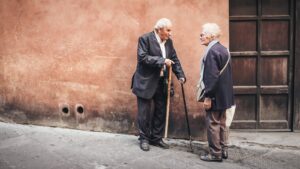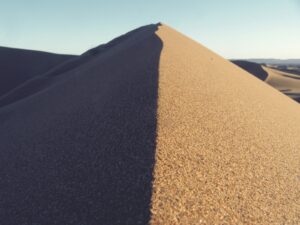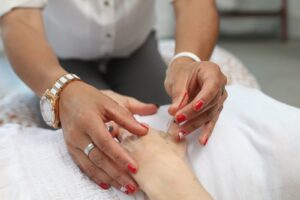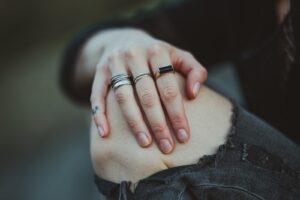Subscribe to the Newsletter
If you are interested in understanding how Traditional Chinese Medicine can improve your life sign up to my newsletter for the latest updates.

For acupuncture study or a reading list, everyone has their own favourites: here are mine.
These are books that I suggest patients read to give them more of an idea about acupuncture and Chinese medicine.
Some of them are good introductions, several are practical, and one is definitely a text-book. You can tell from the price!
If, however, you want to become a professional acupuncturist click on acupuncture schools.
This is a great book, often used as an introduction to acupuncture study. It explains in simple terms many of the concepts used in Traditional Chinese medicine.
Ted Kaptchuk has an enquiring mind and spent many years in China intensively studying.
Angela Hicks has written several books about the Five Element (or 5-Phase) system, and this is the easiest to read.
This is often used for acupuncture study by schools of Chinese medicine that emphasise the Five Element system.
The Five Element system is a way of using acupuncture in Chinese medicine that is probably as old as the Yin/Yang system. The concept is full of wisdom, and the guidelines are useful.
This is a longer book: full of interest but you may take a little while to adapt to this way of thinking about health.
It’s not easy all through and some of it is of more interest to practitioners for acupuncture study. That’s especially true if they ever attended courses given by Dr Hammer’s Chinese mentor Dr John Shen, because of his unique insights, handed down to Leon Hammer. I attended a series of seminars given by Dr Shen in London in 1979/80 and wish I could find the notes I took then. (Actually, I do know where they are – they’ll be in the last place I look, absolutely safe there.)

This is an introduction to how the Chinese look at food energies. Easy to read, but not that easy to apply.
Many of the foods are difficult to find in typical Western countries and don’t assume that you should eat only the foods listed for a given condition. Still, it’s a food summary useful for acupuncture study.
This book is far more than a simple introduction.
In fact, it was probably an important acupuncture study textbook for your acupuncturist when studying.
It doesn’t cover where the different acupuncture points are but discusses in some depth the general theory behind Chinese Medicine.
Not cheap – but then, it’s a textbook!
He’s Turkish and first experienced its power when his mother used cups to help him overcome a cold. Years later, when he studied Chinese medicine, he realised that here was a whole theory of health and disease that embraced cupping as a wonderful therapy.
It makes a great complement to your acupuncture studying!
It’s practical, pretty safe when done as described, and more homes should do it!
Because my page on Qi Stagnation was visited so often by people from all round the world, and because of so many questions about it, I decided to expand it a bit.
When I started I thought it would be a quick 80 pages but in fact it is rather more than that.
Even then, some of the chapters, notably that on Yin and Yang, had to be edited out.
My page on the subject on this site gets a good many visitors, and people seem to think it’s well explained there.
However, many people still email me about it so here’s a book that expands on it. Not too long, and not too expensive I hope. I’ve just re-edited it so it should now be easy to read on your Kindle.
The original creative acts forming both the universe and you, were yang.
Modern life often dulls that initial burst of power in us.
This book explains what to do about it!
But it’s much more than that as it gives you an insight into how the ancient Chinese regarded the whole question of identity and what that means for you.

Well reviewed, you’ll find if you look it up on the Amazon link. Practical and useful.
Glad you don’t like the cover! Nobody does! But it does evoke a reaction.

Stay in Touch!
No spam, only notifications about new articles and updates.

Book a Video consultation if you want to know more about your symptoms
Charles Buck has written a great book. There’s lots in it – which I’ve mostly forgotten, but fortunately I don’t have to remember it as it’s all written there and I don’t have to take an exam in it.
Another great book, in fact two of them. Well worth reading to understand how Chinese culture regards food/nutrition as a constant balancing and medicinal process.
Some great recipes, too. Try the milk rice pudding, a firm favourite with my family.
We can’t leave this list without listing a modern translation of the basic text-book, written 2700 years ago and still pored over, as it as been for millennia. It’s a textbook so don’t expect it to be cheap.
But if you become a student, sooner or later you’ll realise that all Chinese medicine – and Japanese and Korean and Vietnamese – goes back to this extraordinary book.
By the way, the cover may be black, but the ideas certainly aren’t.
What is it? It’s a new translation of the Huang Di Nei Jing Su Wen.
If there’s a book you like which you think I should include in this reading list, let me know by using the form below.
Don’t forget to head it up, ‘Reading List – Suggested Book’.
Such courses last typically 3 or 4 years and give you a qualification which is of degree status.
There are a number of excellent schools of Acupuncture round the world, and the link above takes you to some in the UK.
If you are more interested in the links between China and Scotland, click on SCA.
Lastly, if having looked through this list the idea of reading about acupuncture is giving you a headache, you could always see an acupuncturist!
Aalternatively, if you live near Edinburgh, Scotland, UK, Jonathan (who writes this website) occasionally gives talks and introductory courses – but as yet these aren’t online, so you have to come in person!

This Introductory Chinese medicine course introduces you to the amazing thinking behind this ancient medicine, now increasingly in demand.

The Scottish College for Chinese medicine provides introductory courses for all, explaining Chinese medicine and its cultural background.

Master Tung’s acupuncture is a hidden treasure, lost to China but recovered in Taiwan from where it spread round the world.

Knee pain has five main causes. It’s certainly worth trying acupuncture before you resort to surgery!
Subscribe to the Newsletter
If you are interested in understanding how Traditional Chinese Medicine can improve your life sign up to my newsletter for the latest updates.
Subscribe to the Newsletter
If you are interested in understanding how Traditional Chinese Medicine can improve your life sign up to my newsletter for the latest updates.